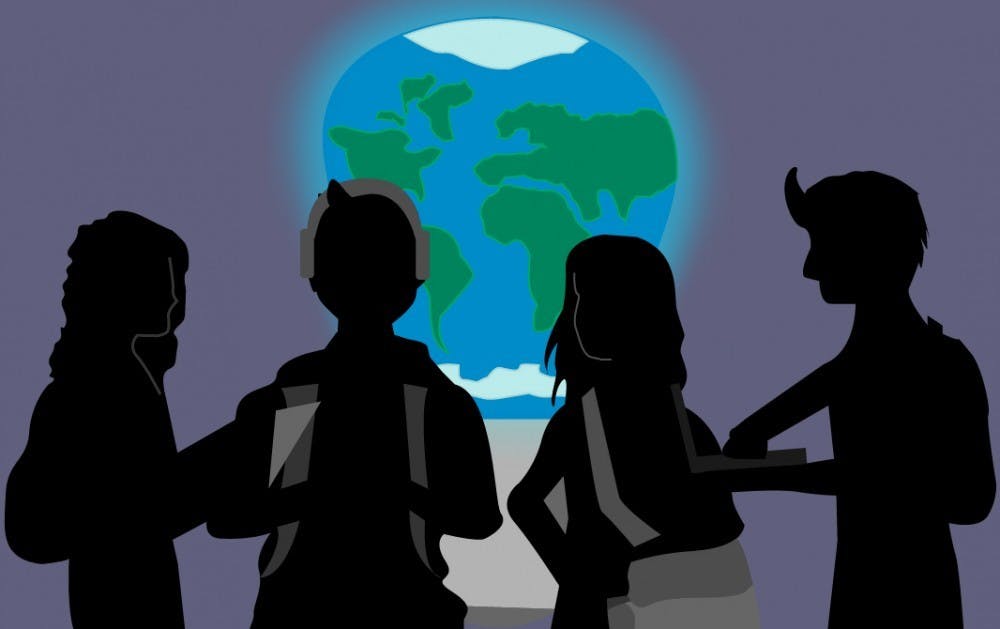ASU masters students are creating a three-part documentary titled "The Sunflower Kids," highlighting the impact of SolarSPELL, an educational initiative aimed to advance literacy skills around the world, especially in communities where access to the internet is limited.
The initiative was created in 2015 after Laura Hosman, an associate professor at ASU and co-founder and director of SolarSPELL, asked her engineering students to create a solar-powered library that would fit into a backpack.
Since then, SolarSPELL has provided 455 digital libraries in countries with limited or no internet access through providing hundreds of digital libraries with educational resources, as well as trainings to build literacy skills.
SolarSPELL provides a solar paneled tool that can connect up to 25 devices such as a phone or laptop to an offline digital library with educational collections and access to content from Khan Academy, Wikipedia and more. No internet, electricity or data is needed.
The initiative is the focus of "The Sunflower Kids," a three-part documentary on the impact SolarSPELL has had in Lesotho, the health library launch in Malawi and the new agricultural library SolarSPELL is piloting in Zimbabwe.
The documentary was created by Allison Hoops, Benjamin Keller and Libbie Farrell, graduate students studying global technology and development who began working on the project two years ago.
Hoops had the idea after watching WEB, a documentary on the One Laptop per Child initiative which, similar to SolarSPELL, aimed to connect communities who don’t have access to the internet.
“(One Laptop per Child) was a very top-down approach and had many failures as a result. SolarSPELL was actually able to learn a lot from those failures and develop into what they are today. So I thought, how neat would it be if we had a documentary on SolarSPELL kind of showing the difference in approach and how that has changed,” Hoops said.
“I remember first learning how to use a computer in class with my teachers and kind of learning about it together," Farrell said. "When it comes to infrastructural resources in communities that are more remote, there are significant barriers when it comes to this information."
The main focus of the documentary was to highlight the implementation of SolarSPELL into a Lesotho community education system. Emphasizing the importance of information literacy and showing the beauty of the cultures in the documentary.
“The final goal was to just highlight the education system in general, and how an education system like the one in Lesotho would really benefit from having published libraries in their schools, when many of them don’t have an actual physical library," Hoops said. "This can really change the quality of education, especially in primary schools."
Both Farrell and Hoops had previously volunteered with Peace Corps, one of SolarSPELL's largest in-field implementation partners. They were able to draw on their previous volunteering experience which also cultivated a curiosity about the relationship between communities and access to information.
“In the long run, my goal would be to bring these libraries to all places where people don’t necessarily have easy access to information like libraries and where there isn’t internet connectivity. Right now, that’s nearly half of the globe’s citizens,” Hosman said.
As the three students make the final edits to the documentary, which they hope to release around the first week of May, Hosman plans to continue expanding SolarSPELL’s reach.
Those interested in supporting the documentary can donate. So far, "The Sunflower Kids" has raised $6,268 of its $15,000 goal.
Edited by Sadie Buggle, Jasmine Kabiri and Anusha Natarajan.
Reach the reporter at croblesr@asu.edu and follow @roblesruizcris on Twitter.
Like The State Press on Facebook and follow @statepress on Twitter.




